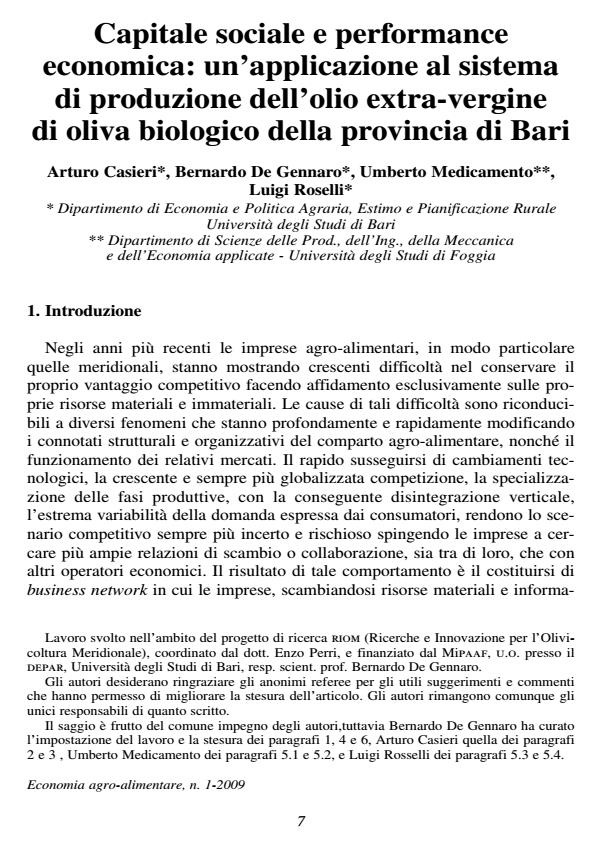Capitale sociale e performance economica: un’applicazione al sistema di produzione dell’olio extra-vergine di oliva biologico della provincia di Bari
Journal title ECONOMIA AGRO-ALIMENTARE
Author/s Arturo Casieri, Bernardo De Gennaro, Umberto Medicamento, Luigi Roselli
Publishing Year 2009 Issue 2009/1
Language Italian Pages 18 P. 7-23 File size 99 KB
DOI 10.3280/ECAG2009-001002
DOI is like a bar code for intellectual property: to have more infomation
click here
Below, you can see the article first page
If you want to buy this article in PDF format, you can do it, following the instructions to buy download credits

FrancoAngeli is member of Publishers International Linking Association, Inc (PILA), a not-for-profit association which run the CrossRef service enabling links to and from online scholarly content.
Capitale sociale e performance economica: un’applicazione al sistema di produzione dell’olio extra-vergine di oliva biologico della provincia di Bari - Social capital and economic firm performances: an application to the organic extravirgin olive oil net-chain in the province of Bari The supply chains of niche market goods like organic products are rapidly evolving. Compared to the conventional supply chains, these are more risky andmarket oriented. Therefore, to build stable networks along and among the chains is becoming an increasingly valuable as a competitive factor. The firms use these networks to exchange tangible and intangible assets. Structural social capital embedded in business networks could influence the firms’ competitiveness. In this perspective it can be worthwhile for the possible normative suggestion for policy makers to consider the control over strategic resources spread in the environment out of the firm, as a competitive advantage source, together with the firm’s internal resources. The external environment is characterized by a net of inter-firms relationships, which pertain to trade exchange, information exchange, shared norms and resources’ association. The strategic resources inside the network, especially information, constitute an asset that companies need to improve their competitive advantage. The structure of relationships enabling the access to those resources, constitute the social capital (sc) which is revealed in the modalities with which firms place themselves in the net: higher the sc, the higher the economic performance. This study aims to show the significance of structural sc in influencing the firms’ economic performances in agribusiness. We will try to test this hypothesis by analyzing the organic olive oil production system in the Province of Bari. In this study we refer to the form of sc linked to the firm’s position inside the net-chain and to the idea of structural holes. Specifically, we decided to measure sc in terms of network constraints - a more constrained entrepreneurial activity implies less structural holes and therefore less sc. As for the firm performance measures, there are several indexes that could be appropriate: from the well known roi (Return on Investment) and ros (Return on Sale), to revenue. Actually, we selected the last one (revenue). It in fact the results are easier to find, and the productive structure of the firms involved in the organic olive oil processing can be considered quite homogeneous. To measure the structure of the relational web we adopt the Social Network Analysis (sna), a method based on the analysis of the actors (individuals, firms, and institutions) involved in a particular context and on the relationships between them. The subject of the analysis is the extra-virgin organic olive oil net-chain in the province of Bari. A set of economic institutions and organizations both located in this province and out of this territory but involved in processing and in trading the extravirgin organic olive oil. The results obtained, show that also in agribusiness netchains, as the organic olive oil, firms gain a higher competitive advantage if the are able to be central in the network of relationships, both horizontal and vertical, assuming an intermediary role in the transactional and informational flows. Further studies are still necessary, since the analysis completely disregards some key factors of competitiveness (although recognizing their relevance), which are not directly connected to the structure of relationships of the netchain as the relational social capital (e.g. trust, norms and expectations) and cognitive social capital (e.g. shared view, common language).
JEL Code: L14
Key words: social capital, network analysis, netchain, economic performance, organic olive oil
Arturo Casieri, Bernardo De Gennaro, Umberto Medicamento, Luigi Roselli, Capitale sociale e performance economica: un’applicazione al sistema di produzione dell’olio extra-vergine di oliva biologico della provincia di Bari in "ECONOMIA AGRO-ALIMENTARE" 1/2009, pp 7-23, DOI: 10.3280/ECAG2009-001002